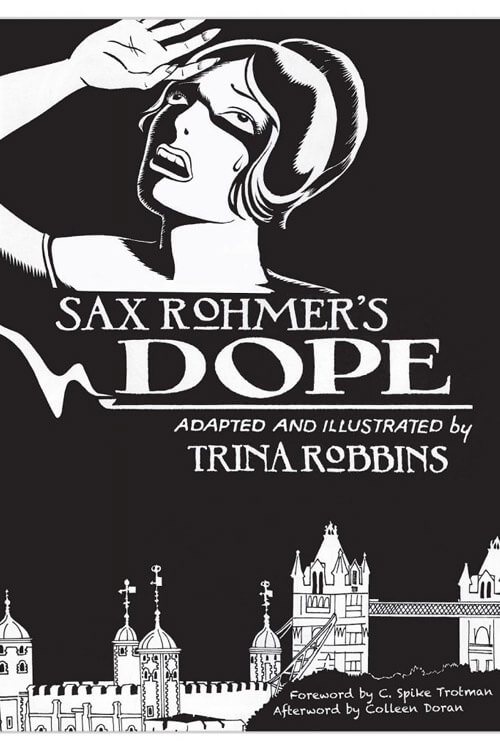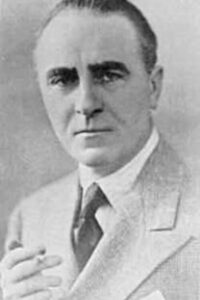
Dope
Monte Irvin, the alderman of the city and prospective Lord Mayor of London, paced restlessly from end to end of the well-appointed library of his house in Prince’s Gate. Between his teeth, he gripped the stump of a burnt-out cigar. A tiny spaniel lay beside the fire, his beady black eyes following the nervous movements of the housemaster.
At the age of forty-five, Monte Irvin was not ill-looking and, indeed, was sometimes spoken of as handsome. His figure was full without being corpulent; his well-groomed black hair, moustache, and fresh, if relatively coarse, complexion and the dignity of his upright carriage lent him something of a military air. He assiduously cultivated this as befitting an ex-Territorial officer, although, as he had seen no active service, he modestly refrained from using any title of rank.
Some quality in his brilliant smile, an oriental expressiveness of the dark eyes beneath their drooping lids, hinted at a Semitic strain, but it was otherwise not marked in his appearance, which was free from vulgarity and essentially that of a successful man of affairs.
Monte Irvin had made a success of every affair in life, with the lamentable exception of his marriage. Lately, his forehead had grown lined, and those business friends who had known him as a man of abstemious habits had observed in the City chophouse, where he launched almost daily, that whereas formerly he had been a noted trencherman, he now ate little but drank much.
Suddenly, the spaniel leapt up with the toy species’ feverish, spider-like activity and began to bark.
Monte Irvin paused in his restless patrol and listened.
“Lie down!” he said. “Be quiet.”
The spaniel ran to the door, sniffing eagerly. A muffled sound of voices became audible, and Irvin crossed and opened the door following a moment of hesitation. The dog ran out, yapping in his irritating staccato fashion, and an expression of hope faded from Irvin’s face as he saw a tall, fair girl standing in the hallway talking to Hinkes, the butler. She wore soiled Burberry, high-legged tan boots, and a peaked cap of distinctly military appearance.
Read or download Book
Sax Rohmer
Arthur Henry “Sarsfield” Ward (15 February 1883 – 1 June 1959), better known as Sax Rohmer, was an English novelist. He is best remembered for his series of novels featuring the master criminal Fu Manchu.
Biography.
Born in Birmingham to working-class Irish parents William Ward (c. 1850–1932), a clerk, and Margaret Mary (1850–1901), Arthur Ward initially pursued a career as a civil servant before concentrating on writing full-time. He was a poet, songwriter, and comedy sketch writer for music hall performers before creating the Sax Rohmer persona and pursuing a career writing fiction.
Like his contemporaries Algernon Blackwood and Arthur Machen, Rohmer claimed membership in one of the Hermetic Order of the Golden Dawn factions. Rohmer also claimed ties to the Rosicrucians, but the validity of his claims has been questioned. His doctor and family friend, Dr R. Watson Councell, may have been his only legitimate connection to such organisations.
His first published work was issued in 1903 when the short story “The Mysterious Mummy” was sold to Pearson’s Weekly. Rohmer’s main literary influences are Edgar Allan Poe, Arthur Conan Doyle, and M. P. Shiel. He gradually transitioned from writing for music hall performers to concentrating on short stories and serials for magazine publication. In 1909, he married Rose Elizabeth Knox. He published his first book Pause! Anonymously in 1910. In 1934, Sax Rohmer moved into a newly refurbished house, Little Gatton, on Gatton Road, Reigate, Surrey, where he lived until 1946. He died after succumbing to Asian flu in 1959.
After penning Little Tich in 1911 (as a ghostwriter for the music hall entertainer of the same name), he wrote the first Fu Manchu novel, The Mystery of Dr. Fu-Manchu, first published in a serialization from October 1912 to June 1913. It was an immediate success, with its story of Denis Nayland Smith and Dr. Petrie facing the supposed worldwide conspiracy of the “Yellow Peril”. The Fu Manchu stories, together with his more conventional detective series characters — Paul Harley, Gaston Max, Red Kerry, Morris Klaw (an occult detective), and the Crime Magnet — made Rohmer one of the most successful and financially well-off authors of the 1920s and 1930s.
The first three Fu Manchu books were published in the four years between 1913 and 1917, but it was not until 1931 (some 14 years after the third book in the series) that Rohmer returned to the series with Daughter of Fu Manchu. The long interval was because Rohmer wanted to be rid of the series after The Si-Fan Mysteries. Stoll had successfully filmed the first three books in the twenties as a pair of serials.
Rohmer’s first effort at reviving the Fu Manchu property was ultimately reworked as The Emperor of America. The original intent had been for the head of the organization to be Fu Manchu’s daughter. He kept Head Centre as a female criminal mastermind to combat Drake Roscoe but was very unhappy with the book as it started and in its finished form. He would later return to Drake Roscoe and his female supervillain for the Sumuru series. In the meantime, he tried again to focus his energies on what was first titled Fu Manchu’s Daughter for Collier’s in 1930, but with an older (now knighted) Denis Nayland Smith as the protagonist once more. The results were infinitely better, and the series was jump-started.
In the 28 years from 1931 to 1959, Rohmer added ten books to the Fu Manchu series, meaning the series totals 13 books in all (not counting the posthumous short story collection The Wrath of Fu Manchu and Other Stories). The Fu Manchu series was criticized by the Chinese government and Chinese communities in the U.S. for what was perceived as negative ethnic stereotyping. Sociologist Virginia Berridge has stated that Rohmer created a false image of London’s Chinese community as crime-ridden, further claiming that the Limehouse Chinese were one of the most law-abiding of London’s ethnic minorities. Critic Jack Adrian has written: “Rohmer’s racism was careless and casual, a mere symptom of his times”. Colin Watson commented: “So vehement and repetitive were Sax Rohmer’s references to Asiatic plotting against ‘white’ civilization that they cannot be explained simply as the frills of melodramatic narration.”






